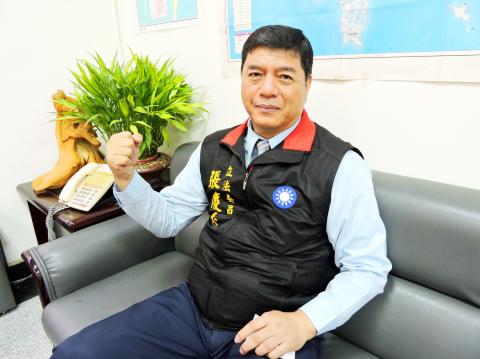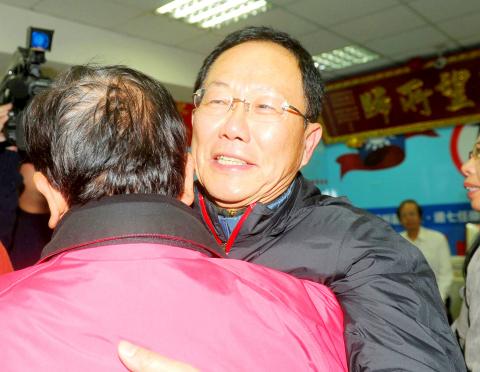The New Power Party (NPP) won five seats in yesterday’s legislative elections to become the third-largest party, representing a triumph for the new “third force” party founded by civil activists associated with the 2014 Sunflower movement.
The NPP scored two legislator at-large seats, winning 6.1 percent of the legislator at-large party vote, in a sharp drop from pre-election polling after the Democratic Progressive Party (DPP) issued calls for pan-green voters to concentrate their votes to protect the “safe” seats on its legislator-at-large list.
However, DPP endorsements helped push some of the party’s district candidates to victory, with former Academia Sinica researcher Huang Kuo-chang (黃國昌) winning New Taipei City’s 12th district, Hung Tzu-yung (洪慈庸) — who is best known for speaking on behalf of her bereaved family after her younger brother, army corporal Hung Chung-chiu (洪仲丘), died in July 2013 under controversial circumstances only days from being discharged — winning Taichung’s third district, and metal band Chthonic’s lead vocalist Freddy Lim (林昶佐) winning a tight race for Taipei’s fifth district in a surprise upset.

Photo: CNA
The DPP endorsed Huang, Lim and Hung in a bid to topple Chinese Nationalist Party (KMT) incumbents in what were previously considered pan-blue districts.
The party’s other district candidate, human rights lawyer Chiu Hsien-chih (邱顯智), was defeated by former DPP caucus whip Ker Chien-ming (柯建銘) in a three-way race for Hsinchu City’s legislative district after refusing to drop out of the race in response to DPP pressure.
The NPP’s success came as the Taiwan Solidarity Union’s (TSU) support crumbled, losing all three of its legislator-at-large seats.

Photo: Lin Hsin-han, Taipei Times
Pairing with the pro-independence leftist activist group Radical Flank (基進側翼), whose Chairman Chen Yi-chi (陳弈齊) headed the party’s legislator-at-large slate, failed to ward off a sharp drop in support, with the party winning 2.5 percent of the at-large vote, falling short of the 8.96 percent it won in 2012.
National Taiwan University political science professor Wang Yeh-lih (王業立) said the rise of the NPP was the main factor behind the TSU’s decline.
“The NPP stems from the leadership of the Sunflower movement, which opposed a trade in services agreement with China, so they attracted a substantial portion of voters dissatisfied with China. These voters mainly voted for the TSU in the election four years ago,” National Taiwan University political science professor Wang Yeh-lih (王業立) said. “As TSU’s candidates were not as well-known as the NPP’s, and the NPP is skilled at using new media, the NPP was able to achieve much greater visibility than the TSU.”

Photo: Lai Hsiao-tung, Taipei Times
The Green Party-Social Democratic Party Alliance won only 2.52 percent of the legislator at-large vote, also failing to win any district seats.
The Social Democratic Party, which was founded by many long-standing social campaigners, had competed with the NPP to carry the “third force” banner after a split within the movement, joining forces within the Green Party after integration talks broke down over relations with the DPP.
While the NPP endorsed DPP presidential candidate Tsai Ing-wen (蔡英文) and — with the exception of Chiu — competed only for districts where the DPP “made way,” the alliance did not coordinate with the DPP.

Photo: CNA
The People First Party (PFP) received 6.52 percent of the legislator-at-large vote, holding on to its two legislator-at-large seats.
The New Party received 4.18 percent of the vote, crossing the newly lowered 3.5 percent threshold to receive election subsidies.
The Republican Party received only 1.62 percent of the vote, while losing its sole legislative seat representing Hsinchu County, after the party’s chairwoman and sole legislator Hsu Hsin-ying (徐欣瑩) withdrew from the race to serve as PFP presidential candidate James Soong’s (宋楚瑜) running mate.

Photo: CNA

Several Chinese Nationalist Party (KMT) officials including Chairman Eric Chu (朱立倫) are to be summoned for questioning and then transferred to prosecutors for holding an illegal assembly in Taipei last night, the Taipei Police said today. Chu and two others hosted an illegal assembly and are to be requested to explain their actions, the Taipei City Police Department's Zhongzheng (中正) First Precinct said, referring to a protest held after Huang Lu Chin-ju (黃呂錦茹), KMT Taipei's chapter director, and several other KMT staffers were questioned for alleged signature forgery in recall petitions against Democratic Progressive Party (DPP) legislators. Taipei prosecutors had filed

Taiwan would welcome the return of Honduras as a diplomatic ally if its next president decides to make such a move, Minister of Foreign Affairs Lin Chia-lung (林佳龍) said yesterday. “Of course, we would welcome Honduras if they want to restore diplomatic ties with Taiwan after their elections,” Lin said at a meeting of the legislature’s Foreign Affairs and National Defense Committee, when asked to comment on statements made by two of the three Honduran presidential candidates during the presidential campaign in the Central American country. Taiwan is paying close attention to the region as a whole in the wake of a

NEW WORLD: Taiwan is pursuing innovative approaches to international relations through economics, trade and values-based diplomacy, the foreign minister said Taiwan would implement a “three-chain strategy” that promotes democratic values in response to US tariffs, Minister of Foreign Affairs Lin Chia-lung (林佳龍) said. Taiwan would aim to create a “global democratic value chain,” seek to capitalize on its position within the first island chain and promote a “non-red supply chain,” Lin was quoted as saying in the ministry’s written report to the Legislative Yuan submitted ahead of the legislature’s Foreign Affairs and National Defense Committee meeting slated for today. The Ministry would also uphold a spirit of mutual beneficial collaboration, maintaining close communication and consultations with Washington to show that Taiwan-US cooperation

President William Lai (賴清德) has appointed former vice president Chen Chien-jen (陳建仁) to attend the late Pope Francis’ funeral at the Vatican City on Saturday on his behalf, the Ministry of Foreign Affairs said today. The Holy See announced Francis’ funeral would take place on Saturday at 10am in St Peter’s Square. The ministry expressed condolences over Francis’ passing and said that Chen would represent Taiwan at the funeral and offer condolences in person. Taiwan and the Vatican have a long-standing and close diplomatic relationship, the ministry said. Both sides agreed to have Chen represent Taiwan at the funeral, given his Catholic identity and